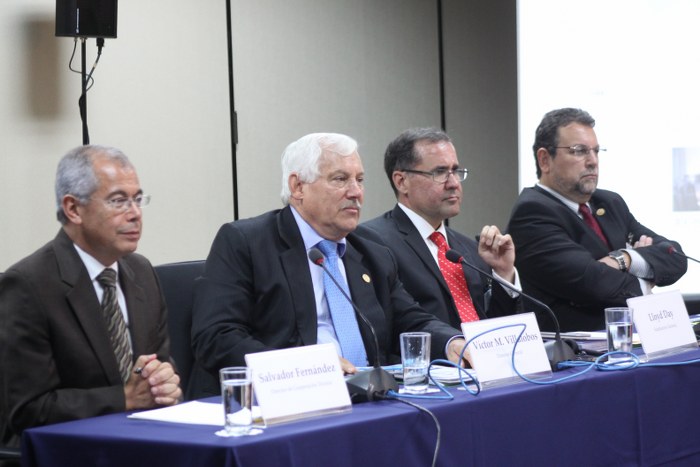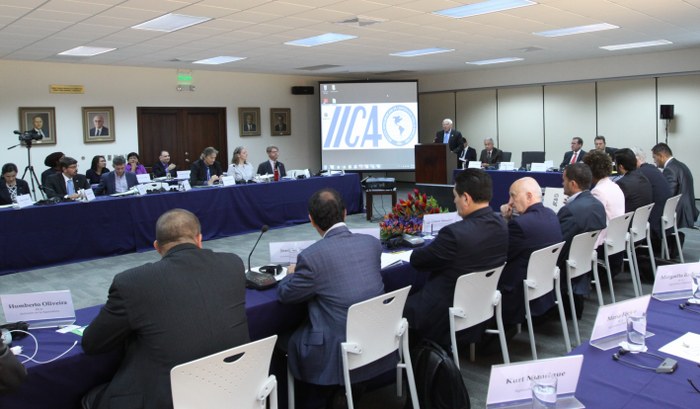At the Institute’s Headquarters in Costa Rica, the 2016 achievements in the areas of resilience and risk management, agricultural chains, inclusion, family agriculture, and agricultural safety were analyzed.

San Jose, 18 May 2017 (IICA). To report, analyze, and discuss the major progress, challenges, and opportunities of the Flagship Projects (FP) and the Agricultural Health and Food Safety area were the goals of the II Meeting of the Technical Committees of the Inter-American Institute for Cooperation on Agriculture (IICA).
In order to support its 34 Member States in improving agriculture at the national, regional, and hemispheric levels, the Institute is working on five strategic initiatives:
- Resilience and management of risks in agriculture
- Competitiveness and sustainability of agricultural chains
- Integrated and sustainable management of rural territories
- Productivity and sustainability of family agriculture
- Agricultural health and food safety
“This meeting is a great opportunity to present our achievements and to look critically at the areas in which we have failed, to identify the areas where a deeper impact is possible, to determine where the opportunities lie in order to concentrate our efforts and resources, and to begin the process of developing a future vision for IICA in the coming years”, stated Victor M. Villalobos, Director General of the Institute.

During the meeting, which was held as part of the 75th anniversary of the Institute, the leaders of each of these initiatives presented their main achievements and results from 2016.
Contributions to agriculture in the hemisphere
The FP entitled Resilience in Agriculture supported 6 000 professionals in improving their technical capacities by contributing to the preparation and use of soil maps, water, climate risk, and planning strategies. In addition, the support provided via articulation mechanisms to facilitate decision-making in regards to public policies aimed at creating a more resilient agriculture, and for validating a methodology for adaption to climate change when developing plans for the agricultural sector, must be highlighted.
With respect to Agricultural Chains, this flagship project provided training to 14 666 actors and strengthened 1 776 institutions. Additionally, the projects concerning research on innovation and good practices in agricultural policies stand out among the 422 technical cooperation products; one focuses on the design of policies and the other on the assessment of the effects of the policies.
Another of the benefits focuses on the hemispheric program for strengthening business and associative capabilities, and on the marketing systems that facilitate linking agricultural producers to markets.
Concerning Inclusion in Agriculture, collaborative efforts facilitated the design of public policies, and regional programs on issues such as rural area-based development, strategies for indigenous communities, community ecotourism, and business development for rural youth, among other efforts.

Other achievements of this initiative included strengthening of the knowledge management platform, improved capabilities for organization of rural actors in order to prepare business models and plans (96 economic projects promoted in eight nations), and training processes in empowerment for 1 500 family farmers in twelve countries.
For its part, Family Agriculture provided essential contributions by means of three proposals for public policies for Colombia, Honduras, and Peru; product differentiation strategies for market access; the development of capabilities via studies and analysis of strategies for production in the Caribbean; sustainable production systems and the systematization of local knowledge; ancestral practices; and good production practices.
Additionally, 100 farmer organizations in Latin America and the Caribbean were trained in associative capabilities. At the same time, 1 455 service providers, rural youth, and producers improved their understanding of intensified production, entrepreneurship, planning, leadership, and business management.
Lastly, Agricultural Health and Food Safety supported the harmonization and implementation of international standards, such as the Codex Alimentarius. One thousand four hundred professionals from 12 countries were instructed in the Food Safety Modernization Act (FSMA) and 2,400 participants received training in biotechnology. In addition, training was provided in the Performance, Vision and Strategy (PVS) instrument and in sanitary emergency response, while the Project on Sanitary and Phytosanitary Measures was developed.
More information:











